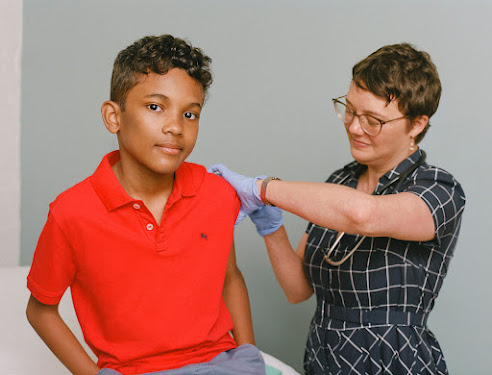 |
| Young boy receiving a vaccine Photo Credit: Heather Hazzan. Shared under a Creative Commons license (CC BY 2.0) |
A recent study finds that concerns about the health effects of COVID-19 are a key variable in determining whether people are hesitant to get vaccinated against the virus. The study also found that an individual’s tendency to plan for the future plays a surprising role in people’s vaccine hesitancy.
At issue is a psychological trait called proactive coping that refers to a person’s tendency to think about and plan for the future.
“We found that the people who were least hesitant about getting vaccinated were people who were at least somewhat concerned about COVID-19 and had high scores on proactive coping,” says Shevaun Neupert, co-author of the study and a professor of psychology at North Carolina State University. “However, we also found that the people who were most hesitant about getting vaccinated also had high scores on proactive coping, but were not very concerned about contracting COVID-19.
“Basically, proactive coping seems to serve as an amplifier for vaccine hesitancy at both ends of the spectrum.”
For this study, researchers surveyed 534 adults in the United States, between the ages of 21 and 79. The survey was designed to assess people’s feelings of COVID-19 vaccine hesitancy and identify cognitive and behavioral predictors of that hesitancy. The researchers conducted the survey in October and November 2020. For context, the first COVID-19 vaccines were made publicly available in the U.S. in December 2020.
The researchers found that more than half of the study participants – 56.7% – were hesitant to get vaccinated.
“And the most powerful predictor of hesitancy was whether people had any anxiety about contracting COVID-19,” says Emily Smith, a co-author of the study and staff researcher at NC State. “The more anxiety people had about contracting COVID-19, the less likely they were to be hesitant about getting a COVID-19 vaccine.”
“We were surprised at the relationship we saw between anxiety and proactive coping,” Neupert says. “For example, people who scored high on proactive coping were much less likely to have vaccine hesitancy if they had even modest levels of concern about contracting COVID-19. And we did not expect proactive coping to amplify vaccine hesitancy in people who were not concerned about contracting COVID-19.”
The researchers note that all of the study results held true regardless of age, race, gender, educational background, how they rated their own health, or how much they felt they knew about COVID-19.
“Our findings can inform future efforts to increase vaccine uptake,” Smith says. “This study suggests that messaging should underscore the harms associated with contracting COVID-19, rather than focusing largely on vaccine safety and efficacy.”
Published in journal: Public Health Challenges
Additional information: Authors: MacKenzie L. Hughes and Clara W. Coblenz, Georgia Tech; Shevaun D. Neupert, Emily L. Smith and Samuel G. Macy, North Carolina State University; Ann Pearman, MetroHealth Medical Center (Cleveland, Ohio)
Source/Credit: North Carolina State University | Matt Shipman
Reference Number: psy030623_01

.jpg)





.jpg)